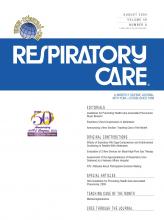Abstract
INTRODUCTION: Respiratory care is expensive and time-intensive, inappropriate care wastes resources, and failure to provide necessary and appropriate respiratory care may adversely affect patient outcomes.
OBJECTIVE: To determine the appropriateness of basic respiratory care delivered at a 450-bed Veterans Affairs hospital during a 3-month interval.
METHODS: We determined (1) the percentage of delivered respiratory care that was not indicated (based on standardized clinical practice guidelines), (2) the percentage of respiratory care that was indicated but not ordered (based on standardized clinical practice guidelines), and (3) the labor cost and potential savings of protocol-based respiratory care at our hospital. We selected 5 assessment days, occurring at 2-week intervals. All patients who received basic respiratory care underwent a complete respiratory care assessment, including medical records review, patient interview, physical assessment, and measurement of blood oxygen saturation (via pulse oximetry) and inspiratory capacity. Intensive care patients were excluded from the study. The assessment instrument provided a standardized format based on American Association for Respiratory Care clinical practice guidelines.
RESULTS: We assessed 75 patients. A mean of 24.8% of the delivered respiratory therapies reviewed were not indicated. The percentages of ordered but not indicated therapies were: oxygen 17.7%; all categories of aerosolized medications (bronchodilators, mucolytics, anti-inflammatory agents) 32.4%; chest physiotherapy 37.5%; lung expansion therapy 7.7%. A mean of 11.8% of the patients assessed were not receiving respiratory care that was indicated. The percentages of indicated but not ordered therapies were: oxygen 5.3%; bronchodilator 5.3%; lung expansion therapy 36%.
CONCLUSION: A mean of 24.8% of the basic respiratory care procedures delivered were not indicated and 11.8% of patients were not receiving care that was indicated. Inappropriate utilization of respiratory care services may increase costs and adversely affect morbidity, mortality, and duration of stay. We believe that implementation of respiratory care assessment protocols based on nationally accepted clinical practice guidelines can reduce unnecessary care, optimize care delivered, and may reduce costs and improve outcomes.
Footnotes
- Correspondence: David C Shelledy PhD RRT, Office of the Dean, College of Health Related Professions, The University of Arkansas for Medical Sciences, #619, 4301 W Markham, Little Rock, AR 72205-7199.
- Copyright © 2004 by Daedalus Enterprises Inc.







